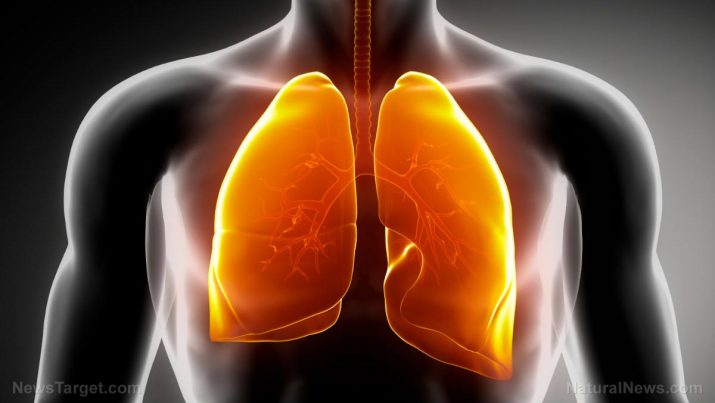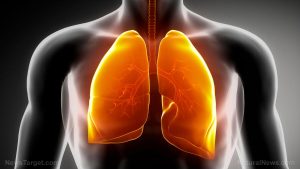
Pulmonary hypertension – causes, side effects and treatments at NaturalPedia.com
Tuesday, June 19, 2018 by Carol Anderson
http://www.naturalpedia.com/pulmonary-hypertension-causes-side-effects-and-treatments-at-naturalpedia-com.html

Pulmonary hypertension is a fatal, degenerative disease that refers to the abnormal increase in blood pressure in the blood vessels that collect oxygen from the lungs. This leads to the disruption of blood flow which will pressure the blood to pump blood harder, and eventually make the heart grow weak.
Unlike general hypertension which can be prevented and treated with a lifestyle change, pulmonary hypertension has genetic factors which makes it irreversible.
People who are 75 or older are commonly the ones who develop the disease. In the U.S., pulmonary hypertension is responsible for at least 15,000 deaths annually.
According to the World Health Organization, pulmonary hypertension has five groups:
-
Group 1 – Pulmonary arterial hypertension (PAH)
-
Group 2 – Pulmonary hypertension due to left-sided heart disease
-
Group 3 – Pulmonary hypertension due to lung diseases and/or hypoxia
-
Group 4 – Chronic thromboembolic pulmonary hypertension (CTEPH)
-
Group 5 – Pulmonary hypertension with unclear or multifactorial etiologies.

Known risk factors and symptoms of pulmonary hypertension
The following are symptoms associated with pulmonary hypertension:
- Dyspnea or shortness of breath. This happens even after doing a simple physical activity.
- The feeling of fatigue and syncope – fainting and dizziness.
- Chest pain.
- Quick heartbeat.
- Pain on the upper right side of the abdomen.
- Decreased appetite.
There are instances when no symptoms appear until the condition actually gets worse.
Body systems affected by pulmonary hypertension
Pulmonary hypertension can lead to further complications, especially if medical assistance is not immediately sought. It can cause blood clots, an irregular heartbeat, or right-sided heart failure. There is also a possibility of blood entering the lungs and hemoptysis, or coughing up blood.
All of these complications are dangerous and can lead to death.
Food items or nutrients that may prevent or relieve pulmonary hypertension
It helps to take care of the cardiovascular health to prevent pulmonary hypertension. Here are some known herbs and supplements that can support cardiovascular health:
- Coenzyme Q10 – Beef, liver, sardine. mackerel, and spinach
- L-carnitine – Turkey meat, pork loin, pumpkin seed, soybean, and peanuts
- Magnesium – Spinach, fruits, nuts, legumes, and seafood
- Potassium – Sweet potato, navy bean, yogurt, banana, and cantaloupe
- Vitamins E and C – Papaya, citrus fruits, strawberries, bell peppers, and broccoli
- Taurine – Shellfish, turkey, and chicken
- Danshen
- Hawthorn
- Linden
- Rosemary
Symptoms can be relieved with some dietary changes like:
- Consuming food with high nutritional value.
- Limiting the daily calorie intake.
- Cutting down on foods with high sugar, saturated fats, and cholesterol content.
- Eating fiber-rich foods.
- Reducing sodium intake.
- Monitoring fluid intake.
Treatments, management options for pulmonary hypertension
Pulmonary hypertension has no cure, however, there are both conventional medicine and natural remedies that can treat the disease. The following are simple things that can help address the condition:
- Regular exercise
- Getting enough rest
- Staying away from stress
- Avoiding high altitudes
- Maintaining normal blood pressure
- Eating healthy and maintaining weight
Pulmonary hypertension is a serious illness which means it’s vital that an expert checks up on a patient before doing any self-medication. Moreover, treatments may vary depending on the severity of the condition.
Where to learn more
- Dispensing with the Truth: The Victims, the Drug Companies, and the Dramatic Story Behind the Battle over Fen-Phen
- Antidepressant drugs are murdering babies before they’re even born: SSRIs cause birth defects, miscarriages and complications
- 10 Ways to DETOXIFY your dirty lungs
- Natural Appetite Suppressants for Safe, Effective Weight Loss
- 5000 Years Old Tibet Remedy That Can Be Used Only Once In 5 Years!
Summary
Pulmonary hypertension is a serious, fatal disease which happens when blood-carrying arteries flowing to the lungs are constricted. This causes an increase in blood pressure and is common in people aged 75 or older.
Common signs include shortness of breath, fatigue and syncope, chest pain, fast heartbeat, pain on the upper right side of the abdomen, and decreased appetite.
The disease can cause fatal complications like blood clotting, irregular heartbeats, or right-sided heart failure.
While the condition doesn’t have a cure, its symptoms can be relieved with lifestyle adjustments. In some cases, medications may be prescribed.
Sources include:
Tagged Under: Tags: pulmonary hypertension





